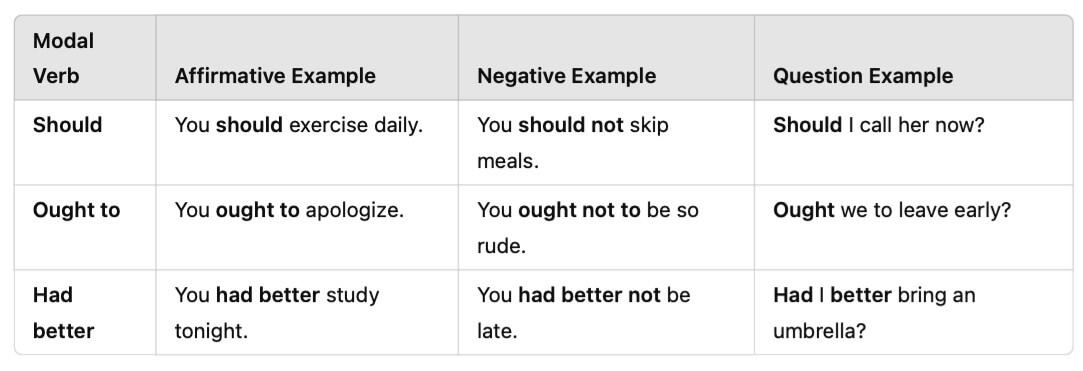- Home
- Modals in English grammar
- Modals of suggestion and advice
Modal Verbs of Suggestion and Advice
Modal verbs of suggestion and advice are a crucial element in mastering the English language. Used to offer recommendations, suggestions, and guidance, these verbs help in expressing opinions or making proposals.
Among the most common modal verbs of suggestion and advice are:
- should
- ought to
- had better
The Structure
They are all formed by:
Subject + Modal Verb + Base form of verb
However, there is a 'to' with 'ought' which the others do not have. Here is a breakdown of how to use modal verbs of suggestion and advice for affirmative, negative and questions.
Examples of Modals of Suggestion/Advice

Differences Between the Modals
Though they are all used for suggestion and advice, there are subtle differences between them that you need to be aware of.
Should
Let's start with "should," which is arguably the most popular modal verb for giving advice.
The Grammar
In grammatical terms, "should" is followed by the base form of a verb. For instance, in the sentence "You should study more for the exam," "should" is followed by the base verb "study."
It can also be contracted in negatives and questions. In a negative form, it's contracted to "shouldn’t," as in:
- You shouldn’t skip breakfast.
For questions, "should" precedes the subject:
- Should you finish your homework first?
When to use it
In a friendly manner, "should" implies that there is a good reason to follow the advice, but it does not carry a strict sense of obligation. In informal advice between friends, "should" is often preferred to "ought to" or "had better" due to its friendly nature.
Ought To
The Grammar
Grammatically, "ought to" has a stable form, as it is always followed by the full infinitive of a verb. For example:
- You ought to check your work for errors.
Unlike "should," "ought to" is less frequently used in contractions, but it's not unheard of in informal speech for negative constructions, where it is paired with 'not'.
- You ought not to eat too much sugar
- You oughtn't eat too much sugar
But this is somewhat formal and old-fashioned. In questions, "ought to" takes a similar construct to "should," as in:
- Ought you to apologise to her?
When to use it
"Ought to" is quite similar to "should" in meaning and usage, but it is slightly stronger. It can come across as more formal or old-fashioned, so it's best used for written advice or formal situations.
Had Better
The Grammar
The structure for "had better" is straightforward: it is always followed by the base form of a verb. For example:
- You had better call your mum.
We do contract the 'had' in spoken English, so we'd say:
- You'd better call your mum.
However, contractions like "hadn't better" are considered awkward and rarely used in English. Hence "had better not" should be employed instead, as in:
- You had better not be late.
To form questions, we can use a contraction, e.g.:
- Hadn't we better leave now?
When to use it
"Had better" carries a slightly different nuance compared to "should" and "ought to." It often communicates a sense of urgency or warns about negative consequences if the advice is not heeded. For example;
- You'd better leave now or you'll miss your last bus home
Past Suggestions and Advice
An interesting aspect of modal verbs of suggestion and advice is their use in expressing past actions.
Not all modals adapt well to past situations, but "should have" and "ought to have" are common structures. These imply that the advice was not followed in the past, often carrying an air of regret.
The structure is: Modal Verb + Have + Past Particle
- You should have listened to the warnings
- You ought to have seen the movie
"Had better have" tends not be be used as it sounds awkward.
New! Comments
Any questions or comments about the grammar discussed on this page?
Post your comment here.








